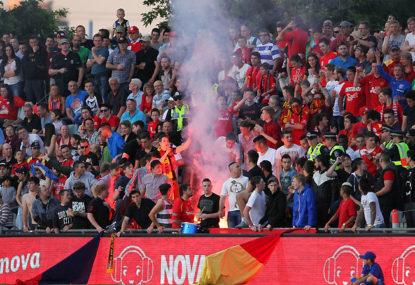Matthew Harbinson
new author
Roar Rookie

Having been part of the Adelaide United Red Army for five years, I’ve seen involvement in active support, as well as general attendance, ebb and flow.
As the football chant goes, “You only sing when you’re winning”, sadly for club administrations and the players; the same seems to go for attendance.
So I was very interested to read Mike Tuckerman’s article on attitudes towards active support.
Tuckerman claims in his article that authoritarianism runs strong in Australian social culture.
I’m of the opinion that he’s generally correct, but attaching it to the A-League is perhaps misguided.
Sport in Australia is, and has always been, an immersive experience, particularly in South Australia.
Look at the clashes and the rivalry at the Showdown with the fans shouting at players and coaches, or the unique social experience of ‘The Hill’ at Adelaide Oval.
In my view, the authoritarianism is displayed by those who avoid the game itself; and to a lesser extent, those without families in the east/west Bays.
Not so much in adherence to social codes of politeness and respect, but in recognising and avoiding the consequences of breaking the law, or being perceived to be acting improperly.
This is where the damaging concept of the ‘football hooligan’ comes into play. Aside from news stations airing 30 seconds of games footage, the video images portrayed often convey danger.
Flares going off portray imagery of smoke and fire.
Police presence indicates potential, or even ‘expected’ criminality, and images of supporters marching with flags ties in to an authoritarian-based suspicion of those who protest.
I’m not a particularly big bloke, and upon hearing that I sit in the active support areas I’m often asked by family, ‘But, isn’t it dangerous?’
My response continues to be, “No, it’s not.”
My experience with the Adelaide WESLO security group has been positive.
Most of the time the security have been friendly and keen to assist in allowing for functional crowd control. Even in the case of a flare, their actions demonstrate a commitment to safety.
Of course there’s the occasional guard who attempts to stamp his authority with an imposing glare and crossed arms, but honestly, they’re just doing their job.
Their presence is certainly better for the fans than police circling the support areas, which creates a horrible atmosphere of confinement. The Adelaide United crew have got it right with bringing in private security.
In a game that can be bogged down in defensive passing with no goals, active support brings an energy to the game, and the dancing and jumping and singing brings a bit of the global experience to little old Australia.
Tuckerman is absolutely correct. The very element that differentiates A-League from other sports is a key part of its appeal.
Football is still new, and treated with suspicion, but with time and some promotion it will eventually become part of Australia’s sporting fabric.
The Red Army, and other active support groups live by a code, “Cause your friends don’t dance and if they don’t dance… Well, they’re no friends of mine.”
As a fan of Taylor Swift and having attended her concerts, as well as being a huge fan of Adelaide United, I can tell you that dancing and singing to the beat of the drums is an expression of passion across the entertainment spectrum.
Active support will only continue to grow as an element of Australia’s participation in the world game.